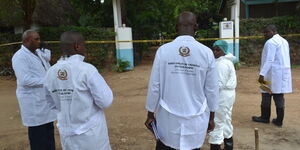Jubilee Nominated Member of Parliament, David ole Sankok, has warned his National Assembly speaker, Justin Muturi and the Senate speaker Ken Lusaka, from convening Parliament and the Senate amid Coronavirus (Covid-19) outbreak in Kenya.
Muturi, on Tuesday, March 31, summoned MPs for a special sitting on Wednesday, April 8, 10 a.m. for purposes of laying of the Public Finance Management (COVID-19) Emergency Fund Response, laying of supplementary estimates for the financial year 2019/20 and consideration of the Public Finance Management (COVID-19) emergency fund response.
Another subject would be consideration of any other legislative measures to cushion the country from the effects of COVID-19, with a lockdown a subject of contention, with many MPs openly advocating for it. However, despite the vitality of the issues, Sankok while speaking with Kenyans.co.ke believed that a different approach of discussion, such as teleconferencing would suit the current situation in the country.
According to the vocal MP who represents the disabled in parliament, their meeting was being marred with doubts over some legislators who had travelled abroad and had been under quarantine. Some MPs were also from some Coronavirus hotspots, Nairobi, Mombasa and Kilifi Counties, and mingling them together would raise suspicion of infection.
The MP further argued that despite legislators undergoing testing at the Parliament buildings, this was not enough to guarantee their safety as they still interacted with the masses and other Kenyans, and with the Ministry of Health detailing that community infections were on the rise in Kenya, a legislator wouldn't know whether he/she had interacted with an infected individual.
"The symptoms take a fortnight before presenting. Also remember, parliament has air conditioning, it is like an aeroplane. There is no free area unlike meeting in an open space, which may not happen.
"The virus may, if one of us is infected, spread through the air," Sankok opined.
He further stated that an MP was a pillar of support for his constituents. At such a moment when the economy was harsh, every resident focused on their leaders for aid, ranging from food and water and funds. Interacting with constituents after risking exposure from Parliament would be detrimental in curbing the spread of the disease.
"In my area, the Maasai Mara shut down, we have seen employees being sent home. All of these individuals look up to us for aid. We shouldn't be putting them at risk. If it were MCAs meeting, it would be easier to contain them as they are from one area, from us we travel from every part of the country, we can easily be carriers," Sankok stated.
A solution, according to him, was to change the standing orders and allow for digital communication, such as teleconferencing to allow the legislators debate on motions.
The Senators met on March 31 and considered measures the government put in place or proposes to cushion Kenyans from the impact of the virus.
Out of 67 members, only 15 were allowed, as it was the quorum deemed necessary for passing a motion. They also sat at a distance from each other, while wearing protective gear. Earlier on, Mutula Kilonzo Junior (Makueni Senator) stated that parties would only pick young and energetic lawmakers and allow the elderly to stay at home, as they were more vulnerable to the disease.












